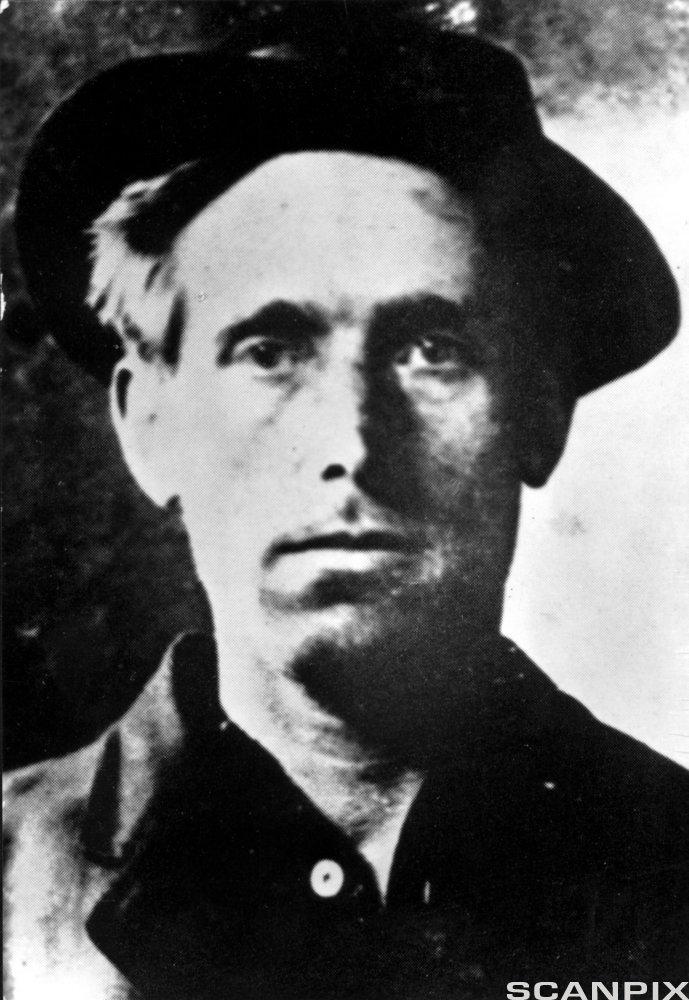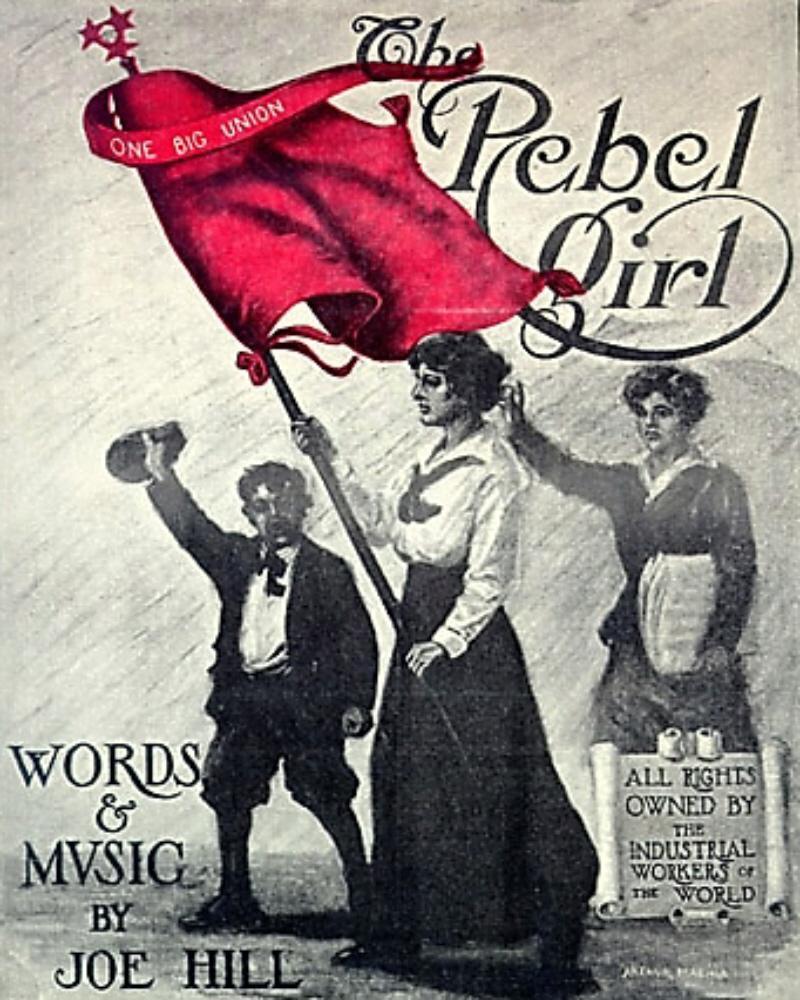Joe Hill – American Icon
I dreamed I saw Joe Hill last night,Alive as you or meSays I, "But Joe, you're ten years dead,""I never died," says he"I never died," says he
There are many reasons why labour movements and unionism have never been established and influential institutions in the USA. Most important is that the cornerstone of American identity is the strong belief in individual freedom, which ideologically has paved the way for a liberal and capitalist society. Besides, labour organising and the fight for workers’ rights are in the USA associated with political systems most Americans would reject. But throughout history there have been activists who saw how workers were exploited by their employers, and stood up for their rights. One of them was a 23-year-old, poor immigrant from Sweden who landed on Ellis Island in 1902 with his brother Paul. His name was Joel Emmanuel Hägglund, which he some years later changed to Joe Hill.
Strikes and Agitation

Joe Hill arrived in America without practical education and speaking poor English, like the millions of other immigrants who became the wheels of the big machinery that was needed to build America. The two first decades of the 20th century saw an explosive development in nearly every field of industry and enterprise. The expansion of the nation would not have been possible without a close to unlimited supply of manual labour. During this period Joe Hill went from being just another unskilled immigrant to becoming one of the world’s most famous working-class activists, feared by powerful capitalists as well as presidents. He became one of the leading figures of International Workers of The World, and was agitating for workers’ rights in rallies all over the American continent. He was also a protest singer who inspired other radical artists such as Woody Guthrie and Bob Dylan. However, such activity often comes at a cost in capitalist America.
The Arrest
Joe Hill had moved to California where he took part in strikes and rallies, such as the San Pedro dock strike in 1911. Hill’s socialist activity made him a marked man, and he was unable to find work in California. In 1912 he moved to Utah where he helped organising a strike at the United Construction Company in Salt Lake City. He was used to being attacked and beaten up, and during his stay there he went to see a doctor about a bullet wound. The doctor reported Hill’s visit to the police who arrested him because he refused to explain how he got the wound. The Utah police contacted the San Pedro police in California who had once arrested Hill for vagrancy and subversive activity. They said that Hill was “an undesirable citizen” and that he belonged behind bars.
Framed
While Hill was staying with friends in Salt Lake City, there was a double murder of a former police officer and his son. Hill was accused of the crime, and even though it was fairly evident that he had nothing to do with the murder he was found guilty and sentenced to death. He was executed in November 1915. There are several elements around the murder and the trial against Hill that seem to indicate that he was framed. It is a fact that there were many influential people who wanted him out of the way. There was another suspect who had a long criminal record, and based on the circumstantial evidence it was more or less obvious that he was the culprit. The 14-year-old daughter of one of the victims had witnessed the shooting and testified in court that she did not recognise Hill as the killer. The court claimed that Hill's bullet wound was from the shooting incident, but the bullet that had gone clean through Hill’s body was never found at the place of the murder, nor was any of his blood. Most historians who have looked into the case agree that it is a grave example of miscarriage of justice. They claim that Hill was clearly framed and eliminated for his radical activity. If so, it is not the only time labour activists have been forcefully silenced in America. After his funeral, which was attended by 30,000 mourners, his ashes were spread over all the states in America.
The Legacy

Today trade unions are a more accepted and visible part of American work life. After all, the right for workers to organise is manifested in basic human rights. But still unionism is frowned upon in the USA, and many employers are hesitant if not unwilling to hire organised job applicants, a fact that may explain why only one third of American workers are organised. The booming industrial development in the southern states during the 80s and 90s is an illustration of the situation; many big companies established their enterprises there because in this region the unions were known to be weaker and the tradition to organise was not as established as in the northern states.
In 2011, a new biography about Joe Hill was published in the USA; its full title reads: The Man Who Never Died. The Life, Times and Legacy of Joe Hill, American Labor Icon. The title indicates that Joe Hill’s political work and visions are today perhaps more than ever manifested in the call for regulated working conditions for millions of exploited workers all over the world.
Tasks and Activities
Genre
Watch this video where Billy Bragg sings about Joe Hill. Do the lyrics agree with the information given in the article above? Compare how Hill's biography is presented in these two genres (lyrics and article) and explain similarities and differences in language, content and presentation.
I Dreamed I Saw Joe Hill Last Night
- Read the lyrics of “ I Dreamed I Saw Joe Hill Last Night ” and compare with the last paragraph of the article.
- Listen to Joan Baez performing the song for Occupy Wall Street. Why is this song still relevant? Why would Baez sing at an Occuppy Wall Street rally.
Comprehension and Research
- Why is there no tradition for labour unions in the USA?
- Another union activist in the USA was Jimmy Hoffa. Search the net for information about what happened to him, and compare with Joe Hill.
- Use the Internet to find some examples of big American companies that have established themselves in the South over the last 30 years.
- See if you can find information about the union policy of some big American companies, e.g. Wal-Mart. What happens when these companies establish themselves abroad where there may be different traditions for workers organising?
Vocabulary
Explain in English the meaning of the following words / expressions:
- Exploited
- Expansion
- Rally
- Vagrancy
- Subversive activity
- Behind bars
- Criminal record
- Circumstantial evidence
- Miscarriage of justice
- Mourners
- Legacy
- Frown upon
Suggested Key
- Exploited – taken advantage of, misused
- Expansion – growth, extension
- Rally – a public gathering to support or protest, a protest action
- Vagrancy – loitering or being a tramp without address
- Subversive activity – plotting or conspiring against the authorities
- Behind bars – in prison
- Criminal record – a list of felonies and / or criminal acts
- Circumstantial evidence – elements that connect a suspect to a crime scene, but are not direct proof
- Miscarriage of justice – when someone is wrongly convicted
- Mourners – those who grieve at a funeral
- Legacy – what someone (famous) leaves behind, like an inheritance
- Frown upon – to disapprove of something